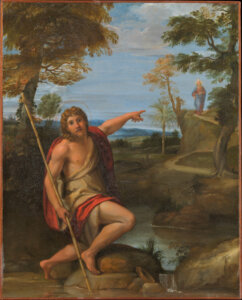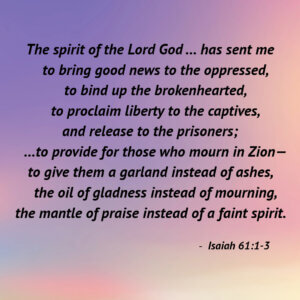
John the Baptist’s Confessed Truth
 As most of you know, I practiced law for 30 years before I was ordained a priest. I wasn’t a litigator and never did any trial work, but instead was what people call a deal lawyer, meaning I worked on big financial transactions for governmental projects, like water and sewerage, electric power, and natural gas. I’ve always said I’m the friendly kind of lawyer. But doesn’t take a trial lawyer’s experience to understand John the Baptist’s context in John’s gospel today. It only takes 5 verses to see that the Baptizer is in a deposition, being examined by a delegation of priests and Levites from Jerusalem. They’re looking at things from all sides, trying to pin him down on who he is, and why he is doing all this work of baptizing and urging repentance.
As most of you know, I practiced law for 30 years before I was ordained a priest. I wasn’t a litigator and never did any trial work, but instead was what people call a deal lawyer, meaning I worked on big financial transactions for governmental projects, like water and sewerage, electric power, and natural gas. I’ve always said I’m the friendly kind of lawyer. But doesn’t take a trial lawyer’s experience to understand John the Baptist’s context in John’s gospel today. It only takes 5 verses to see that the Baptizer is in a deposition, being examined by a delegation of priests and Levites from Jerusalem. They’re looking at things from all sides, trying to pin him down on who he is, and why he is doing all this work of baptizing and urging repentance.
Things are tense in Jerusalem. The Roman leadership there gets worried when popular religious or political figures develop a following. The whole discussion of John the Baptist is framed in legal language from very first lines of John’s gospel, emphasizing the importance of getting John’s role just right: John…was sent from God… as a witness to testify to the light, John’s gospel begins, continuing, This is the testimony given by John when the authorities sent priests and Levites from Jerusalem. Then the priests and Levites pepper the Baptist with questions: Who are you? If you’re not the Messiah, are you Elijah? Well, if you’re not the Messiah or Elijah or the prophet, they say to John the Baptist, who are you? Let us have an answer for those who sent us. What do you say about yourself?
The Voice of One Crying Out in the Wilderness
The choice of the words witness and testify are more than the poetic flourish of the translators who gave us the English version of the Bible we read today. In the Greek, it’s a form of the same word used in each occurrence, repeated five times, and then quickly followed with more legal words: He confessed and did not deny it, but confessed, am not the Messiah… . I am the voice of one crying out in the wilderness, “Make straight the way of the Lord,” as the prophet Isaiah said. John’s gospel presents the Baptizer’s words as the testimony of a sworn witness before a court because it’s really important that we listen closely to John’s testimony about Jesus, remembering the prophet Isaiah was also preaching into a world in crisis.
We read in Isaiah this morning,
The spirit of the Lord God … has sent me
to bring good news to the oppressed,
to bind up the brokenhearted,
to proclaim liberty to the captives,
and release to the prisoners;
…to provide for those who mourn in Zion—
to give them a garland instead of ashes,
the oil of gladness instead of mourning,
the mantle of praise instead of a faint spirit.
We know these words from Isaiah so well, from Isaiah’s own prophecy, repeated by the four gospels, and from the very best of our Advent and Christmas music. They speak to us, because we recognize in our very bones the deep division, conflict, and violence in the times when Isaiah was preaching and prophesying. Isaiah would not be speaking of bringing good news to the oppressed, the brokenhearted, the captives, the prisoners, or those who mourn in Zion (which you know means Jerusalem) if all those listening were already self-governing, joyful, and free.
Make straight the way of the Lord
 So when sworn witness, John the Baptist, testifies in John’s gospel today that he is the voice of one crying out in the wilderness, ‘Make straight the way of the Lord, he is talking to us, in our pain, as we wait this Advent for God’s light to break through the darkness of the Hamas-Israel war, the ongoing war in Ukraine, our climate crisis, and the broad disagreements — on college campuses, in communities, and even sometimes in our own families — as our very humanity and individuality in our own lived experiences causes us to see things differently, and to disagree. How do we respond to the voice crying out in the wilderness to make straight the way of the Lord? John the Baptist preaches repentance, which has a lot less to do with not doing things that society has decided are bad, like gambling, using vulgar language, or drinking, and a lot more to do with listening to each other. To repent is to see things in a new way, or to allow our thinking to be affected by someone else’s lived experience.
So when sworn witness, John the Baptist, testifies in John’s gospel today that he is the voice of one crying out in the wilderness, ‘Make straight the way of the Lord, he is talking to us, in our pain, as we wait this Advent for God’s light to break through the darkness of the Hamas-Israel war, the ongoing war in Ukraine, our climate crisis, and the broad disagreements — on college campuses, in communities, and even sometimes in our own families — as our very humanity and individuality in our own lived experiences causes us to see things differently, and to disagree. How do we respond to the voice crying out in the wilderness to make straight the way of the Lord? John the Baptist preaches repentance, which has a lot less to do with not doing things that society has decided are bad, like gambling, using vulgar language, or drinking, and a lot more to do with listening to each other. To repent is to see things in a new way, or to allow our thinking to be affected by someone else’s lived experience.
We all come from different perspectives, and we have different views. But when we listen deeply, and can see each other as human beings, we find we’re really all way more alike than we are different. We love our spouses, our children, our parents, our friends, and our communities. We want the very best for them in healthcare, in education, in employment, in opportunity, and in their daily lives and happiness. We may differ in our ideas about the best way to accomplish these great goals, but even the most strident voices we hear in public speech today — even in the Israeli Defense Force and Hamas — all come from a profound love of family, friend, and neighbor.
We don’t disagree because we don’t care. We disagree because we care passionately — from our different perspectives — about the same thing. What we have in common is much, much greater than what sets us apart. Another thing that the Baptizer’s courtroom drama can help us remember is the important, holy privilege of really listening to someone else’s truth, with genuine curiosity and an open mind. You don’t have to let go of your own truth to hear someone else’s truth with kindness and compassion. Two things can be true at the same time, and may actually be a matter of experience and perspective. Another thing we learn from this courtroom drama is that even though we are not Elijah, the Messiah, or the Prophet, or even bug-eating John the Baptist in his camel fur vest, our stories are worthy, and it’s really important to listen to each other and get it right and understand who we are — through our own testimony, and not through what others say about us.
Let us love one another, let us love our neighbors as ourselves, let us love our enemies, and let us listen. Let us hear and respect our neighbor’s reality with the tenderness and concern that we feel for our own. We pray for God to break through the darkness of our conflict and separation from each other this Advent as we prayed in today’s Collect:
Stir up your power, O Lord, and with great might come among us; and, because we are sorely hindered by our sins, let your bountiful grace and mercy speedily help and deliver us; through Jesus Christ our Lord, to whom, with you and the Holy Spirit, be honor and glory, now and for ever. Amen.
